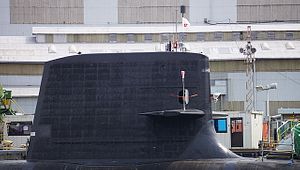There has been quite a bit of defense related news coming out of Japan over the last week, but the biggest stories have to do with Tokyo’s security relationship with Australia. That relationship may be growing, but the much anticipated submarine deal between the two countries received a blow this week. While Australia has been negotiating the purchase of military technology with Japan since this summer, news this September that Canberra may buy as many as 12 Japanese Soryu-class submarines off-the-shelf in order to replace its six Collins-class submarines created excitement for the Japanese and U.S. militaries as they seek greater trilateral integration (through the use of common vessels and communications equipment), as well as for Japanese naval defense contractors Mitsubishi Heavy Industries and Kawasaki Heavy Industries.
However, Reuters reported last Friday that Australian labor unions and politicians are pressuring the government of Prime Minister Tony Abbott to open the deal to an international tender, as other countries’ submarine manufacturers have said they would be willing to undergo production in Australia, potentially saving thousands of naval industry jobs. The government is set to spend $34.3 billion on its new submarine program, and sending the production of these vessels abroad roughly 18 months before federal elections could prove politically disastrous for Abbott.
Japanese defense officials indicated that should Australia open up the bidding process, Tokyo would have to wait and see before deciding to participate, and that the kind of vessel Canberra chose would be the deciding factor, as Japan’s diesel-electric submarine is substantially larger than any European or Turkish variant. On the other hand, Australia’s government is in a very difficult position, essentially deciding between the revival of its domestic shipping industry and further integration with its two most powerful military allies, combined with the transfer of the world’s quietest diesel submarine technology.
While Japan may have reservations about joining the bidding process for Australia’s submarine contract, it is still pushing to further integrate its southern ally in a trilateral defense framework with the U.S. After the three countries finished their first joint training exercise on the Japanese island of Kyushu on November 9, the Japanese defense ministry said it was considering joining the U.S.-Australian Talisman Saber exercises to be held in June 2015 in Australia. The Asahi Shimbun reported that this is “the Abe administration’s latest move to turn the relationship with Australia into a ‘quasi-alliance.’” The chief of staff for Japan’s Ground Self-Defense Forces, General Kiyofumi Iwata seemed to confirm that assessment, stating “it is important to manage regional peace and stability through a multinational approach… Both the United States and Australia are also seeking that, so the thinking of the three nations is the same.”
However, while the U.S. is Japan’s most important strategic ally, the update to their Defense Cooperation Guidelines this year has not gone as smoothly as planned. Both sides have leaked information in the last two months that the guidelines might not be revised until next year, despite high-level public statements that they would meet their year-end deadline. Yet last Friday the Asahi reported that the deadline might be missed due to continuing disagreement between the LDP and its junior coalition partner Komeito over the administration’s new interpretation of collective self-defense. The delay is certainly looking more likely, as rumors of a snap election in the lower house of the Diet by next month could shake up the coalition. If the LDP maintains its control over both houses after the election, it may decide it has the mandate to quickly move forward with its defense agenda, despite any potential coalition partner’s views on the matter.
In other defense related news, Japan reached an agreement with ASEAN to enhance antiterrorism cooperation. The respective countries’ leaders made the announcement on Wednesday at an ASEAN summit in Myanmar, agreeing to cooperate on cybercrime and piracy, which remains a residual problem in the high-traffic sea lanes of Southeast Asia. In what was taken as a reference to fears over a potential rise in the Islamic State’s influence in the region, the statement also called for “countering violent extremism and radicalization that leads to terrorism.”
Finally, the Japanese and Thai defense ministers met in Tokyo on Thursday and agreed that their countries would “cooperate over defense equipment,” in reference to the April change in Japan’s constitution, which now allows it to export military technology. Defense Minister Prawit Wongsuwan said Thailand has “great interest” in Japan’s military technology, while he also said the military regime “is promoting a shift to civil government.”
































